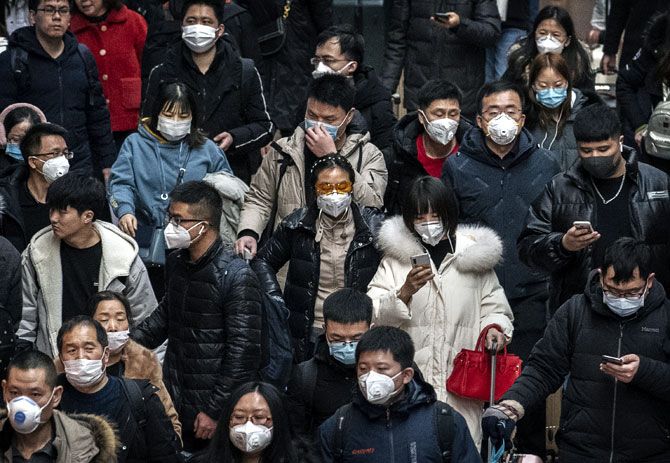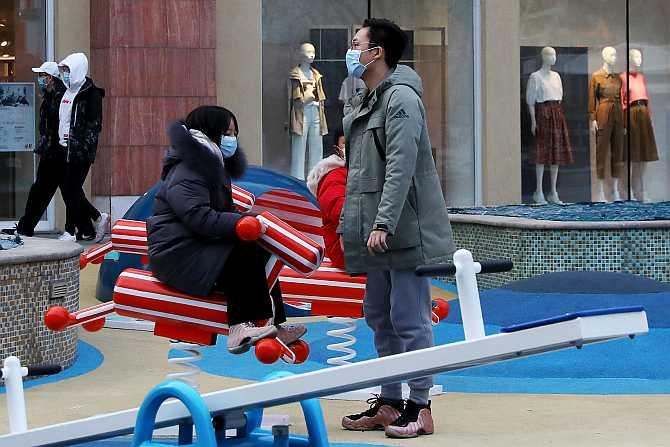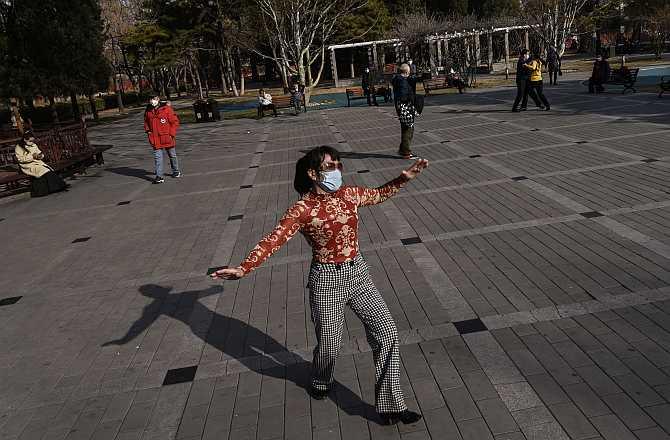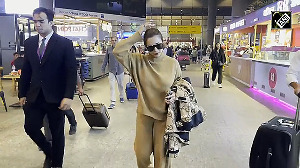Endearing moments of family time, impromptu singing sessions, ping-pong games on dinner tables and a constant stream of online humour provide a much-needed salve of hope and sanity in this time of distress.
Shruti Bajpai reports.

"N i hao, how are you all doing?" shouts a young woman, in a short format video, leaning against the railing of her apartment balcony.
"I haven't stepped out of my home in over two weeks! What is everyone up to?" Within seconds, there is a trail of funny rejoinders from apartment after apartment across the street.
"I am eating beef noodle soup for my home-office lunch break. What are all of you eating?" asks the same woman in another similar video, this time, with a steaming bowl in her hands.
Pat comes a volley of replies, rattling off a variety of lunch menus.
While most of China is faced with yet another week of Covid-19 virus-induced reality -- cordoned off public areas, closed offices, body temperature check points and a pervasive uneasy calm -- the local Internet is alive and buzzing with content that brings out the self-deprecating humour of living and working in a lockdown.
A large part of China's working population is currently working full-time from home.
There are others who can only work sparingly, while there are still more people whose income has come to a standstill, with no hope in sight.
Most of China's technology companies have asked their employees to work from home till the first week of March.
The country's well-entrenched digital infrastructure and advanced mobile phone ecosystems have made remote offices possible and online communication relatively smooth.
Sunny is one such professional who works for a leading internet technology company based in Beijing.
Currently working remotely from her parent's home, Sunny is grateful for the generous workspace that the apartment offers.
Some of her colleagues, she says, are stuck in cramped family homes and are struggling with a lack of privacy and space.
"I do miss the energy of my work environment and social interaction," she rues.
"Our community is connected in our concern and angst over reports of rising cases in Hubei province, but we feel even more connected in these candid moments of humour that serve as welcome distractions and help enliven our current mood," she adds.

Almost all of China is learning to cope with this new normal by immersing themselves in their alternate reality, the online world of social media chat groups and discussions and an endless stream of funny short content videos.
There are Douyin (known as Chinese TikTok to the outside world) videos of bizarre 'working from home' situations, and some amusing ones of parents who mean well but constantly interrupt their children with home-cooked meals during work meetings and calls.
No wonder then that content companies are seeing high traffic when most other businesses are at an all-time low.
Dennis, a young journalist currently working out of his parents's home in Hangzhou, is unable to return to Shanghai for work.
Still, he is busy reporting on the epidemic and feels more overworked than before.
"The nature of my job makes it easy for me to work remotely, and I have my phone to keep me connected with my co-workers and friends. It is not a big deal, we know that the situation is temporary," he shrugs.
Both Sunny and Dennis are grateful for the abundance of family time they suddenly have.
China's policies have left generations of families smaller and smaller.
If these extraordinary circumstances have an upside, it is the closer bonds that have developed over the past few weeks in these small families.
The obviously deeply cherished everyday moments you see online are a manifestation of this.

William is a Mandarin teacher who would normally take up to 50 classes a week.
But his classes have fallen to a trickle, to only a couple of sessions per day.
He spends time catching up on movies on various streaming platforms.
With theatres closed until further notice, these platforms have seen a spike in subscriptions.
When the much-anticipated lunar New Year theatrical release of the Chinese blockbuster Lost in Russia was abruptly cancelled in the wake of the outbreak, Chinese viewers were in for a surprise -- it was streamed for free on several online video platforms.
"The makers of this film may have lost a lot of revenue, but they have gained so much respect and love from us by showing it for free," says William.
On other evenings he and his family enjoy a game of mahjong, a traditional Chinese game that has typically been popular with China's older population but is now gaining increasing acceptance among the younger generation as a cure to boredom.
Lynn, a Beijing-based English teacher who conducts classes out of her home, is struggling as most of her students are too young to be able to learn online.
"I really miss not being able to engage with my students," she says, smiling nervously.
Unable to focus on other activities, she obsesses over daily updates on the epidemic and ends up engaging in animated online discussions.
Small business owners, particularly those in the service industry, have been hit the hardest.
Their shops are shut or threatened with imminent closure, and they have no clients in sight.
Tina, the owner of a beauty spa in the suburbs of Beijing, is tense.
Her spa is now closed till further notice.
"I know that things will eventually get better. But I fear that people will stay away from the close human contact that my line of work requires. I have my staff to look after and rent to pay. This is a huge loss. I need to win back the trust of my clients."
The only silver lining, she says -- her eyes light up -- is that her young daughter is with her.
A significant part of the Chinese population works in cities, while their children live with their grandparents in villages and attend local schools, often able to meet with their parents only twice a year.
The indefinite closure of schools means many children are now at home with their parents.
This, too, though unintended, can be seen as a silver lining in an otherwise coal-black cloud.
When will this impasse end? When will things go back to normal? These are questions that all of China is asking every day.
Questions that don't have answers, yet.
Endearing moments of family time, impromptu singing sessions, ping-pong games on dinner tables and a constant stream of online humour provide a much-needed salve of hope and sanity in this time of distress.
All respondents only preferred to be addressed by their English first names.












 © 2025
© 2025